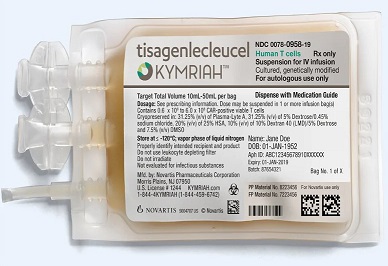Drug News: FDA Warns That CAR-T Therapies Involving Abecma, Breyanzi, Yescarta, Carvykti Or Kymriah Can Increase Risk Of Secondary Cancers!
Nikhil Prasad Fact checked by:Thailand Medical News Team Jan 25, 2024 1 year, 3 months, 1 day, 14 hours, 53 minutes ago
Drug News: The U.S. Food and Drug Administration (FDA) has recently issued a boxed warning on Chimeric Antigen Receptor T-cell (CAR-T) therapies, citing concerns that these innovative cancer treatments may pose a risk of causing secondary cancers. While the FDA emphasizes that the overall benefits of CAR-T therapies continue to outweigh potential risks, the move comes in response to 25 reports of rare blood cancers in patients who have undergone CAR-T treatment.
Understanding CAR-T Therapy
 CART-T-Therapies-Can-Increase-Risk-Of-Secondary-Cancers
CART-T-Therapies-Can-Increase-Risk-Of-Secondary-Cancers
CAR-T therapy is a groundbreaking cancer treatment that utilizes a patient's own immune cells to combat blood cancers such as leukemia, multiple myeloma, and lymphoma. In this procedure, immune cells are harvested from the patient, genetically modified in a laboratory to target cancer cells, and then reintroduced into the patient's body. This approach has shown remarkable success, with reports of patients experiencing long-lasting remissions.
Historical Context and FDA Approval
According to past
Drug News reports, the first CAR-T therapy, Novartis' Kymriah, received FDA approval in 2017, marking a significant milestone in cancer treatment. Subsequently, five additional therapies, including Abecma, Breyanzi, Yescarta, Carvykti, and Kymriah, gained regulatory approval. However, the recent FDA warning instructs the manufacturers of these drugs, including Bristol Myers Squibb, Gilead Sciences, Johnson & Johnson, and Novartis, to update their labels within 30 days to reflect the potential risk of secondary cancers associated with CAR-T therapy.
Manufacturer Responses and FDA's Stance
While some drugmakers, such as Novartis, assert that there is insufficient evidence to establish a direct link between their treatments and cancer, they have committed to working with the FDA to update labels accordingly. The FDA's spokesperson, Carly Kempler, emphasizes that despite the new warning, the benefits of CAR-T therapies still outweigh potential risks. The agency has mandated 15-year follow-up studies for CAR-T therapies to better understand the long-term risks of secondary cancers.
FDA Warning Details
The FDA's warning follows reports of approximately 20 cases of secondary cancers linked to CAR-T treatments, prompting the agency to take action. Patients undergoing CAR-T therapy, often facing limited treatment options, may be at an increased risk of developing secondary blood cancers. The warning includes instructions for manufacturers to monitor patients for secondary cancers and promptly report any cases to the FDA. The agency underscores that these secondary cancers may manifest shortly after the infusion of CAR-T therapy and could lead to severe outcomes, including hospitalizations and death.
https://www.fda.gov/
vaccines-blood-biologics/safety-availability-biologics/fda-investigating-serious-risk-t-cell-malignancy-following-bcma-directed-or-cd19-directed-autologous
Medical Community's Perspective
The medical community acknowledges that CAR-T treatments are still relatively new, and the FDA's scrutiny is essential for patient safety. However, some experts argue that the potential risks should be viewed in the context of the severe conditions these therapies aim to treat. Patients opting for CAR-T therapies typically have limited alternatives, and the potential benefits, including prolonged survival, often outweigh the rare occurrence of secondary cancers.
Analysis of Secondary Cancer Risks
A recent analysis conducted by the Perelman School of Medicine at the University of Pennsylvania sheds light on the incidence of secondary cancers following CAR-T therapy. The study, which involved more than 400 patients treated with commercially available CAR-T therapies, revealed that only 16 patients were diagnosed with a second cancer after receiving CAR-T treatment. Most of these secondary cancers were solid tumors, such as skin, prostate, and lung cancers. The study's findings provide valuable insights into the rare occurrence of secondary cancers and emphasize the importance of long-term follow-up and reporting systems for new cancer treatments.
https://www.nature.com/articles/s41591-024-02826-w
Penn Medicine's Protocols and Contributions
As a leader in CAR-T cell therapy, Penn Medicine has well-established protocols for monitoring patients during and after treatment. The institution participates in national reporting requirements and databases to track outcomes data from all cell therapy and bone marrow transplants. The detailed analysis conducted by Penn Medicine reinforces the overall safety profile of CAR-T therapy, indicating that the incidence of secondary cancers is relatively low.
Conclusion
The FDA's warning on CAR-T therapies highlights the agency's commitment to ensuring patient safety and monitoring the long-term effects of innovative cancer treatments. While acknowledging the rare risk of secondary cancers, the medical community emphasizes that the benefits of CAR-T therapies, including potential cures for otherwise challenging conditions, should not be overshadowed. Ongoing research, collaboration between regulatory bodies and drug manufacturers, and continuous monitoring of patient outcomes will contribute to a comprehensive understanding of the risks and benefits associated with CAR-T therapies.
For the latest
Drug News, keep on logging to Thailand Medical News.
